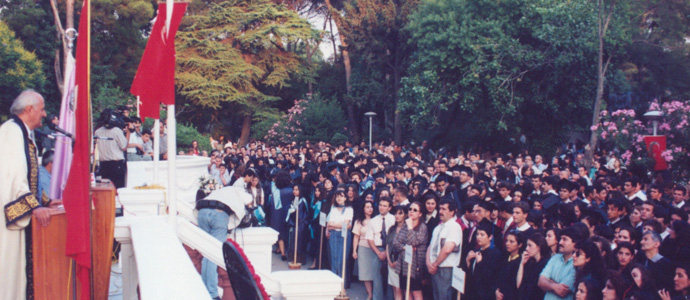About DEU
Dokuz Eylül University- From the Past to Today
Dokuz Eylul University, knowing society can develop only by means of good quality education, provides quality education to promote individual independence.
DEU was founded on the 20th of July 1982 by “Higher Education Instututes Foundation Law no: 41” as the second state university in İzmir, after Ege University. Dokuz Eylul University started with a total of 24 facilities, which were aquired from Ege University, the Ministry of Education,Youth and Sports, and the Ministry of Culture and Tourism.
Dokuz Eylül University has gone through an intense growth process and increased in size by its 10th anniversary in 1992 to 41 institutions, distributed across 5 cities in the Aegean Region. Subsequently some of these institutions have contributed to the foundation of four other universities: Adnan Menderes University- Aydın, Muğla University- Muğla, Celal Bayar University- Manisa and Pamukkale University- Denizli.
Dokuz Eylül University functions as a urban university with its campuses located in several districts of İzmir. These campuses cover 5 731 800 square meters (670 573 sqm) based in Alsancak, Balçova, Narlıdere, Buca (Center– Dokuzçeşmeler – Tınaztepe) Hatay, Torbalı, İnciraltı, Urla, Seferihisar, Ürkmez, Foça, and Karşıyaka.
Prof Dr Ömer YİĞİTBAŞI, who passed away on March the 11th, 2006, was the Founder President. He served between 1982-1987. The presidency passed on to Prof Dr. Namık ÇEVİK 1987-1996. Then between 1996-2000 was Prof Dr. Fethi İDİMAN, and from 2000-2008 Prof Dr. Emin ALICI. All have served successfully as Presidents with significant contributions to the progress and growth of Dokuz Eylül University. The current President is Prof Dr Mehmet FÜZÜN who took over the Presidency on the 6th of August, 2008.
Dokuz Eylül Üniversitesi, after 30 years since its foundation, serves 54895 students in 13 faculties, 5 graduate schools, 4 schools, 1 conservatory, 6 vocational schools, 5 Institutes and 49 research centers; forming a total of 83 education institutions, together with 3103 academic and 3359 administrative staff.



